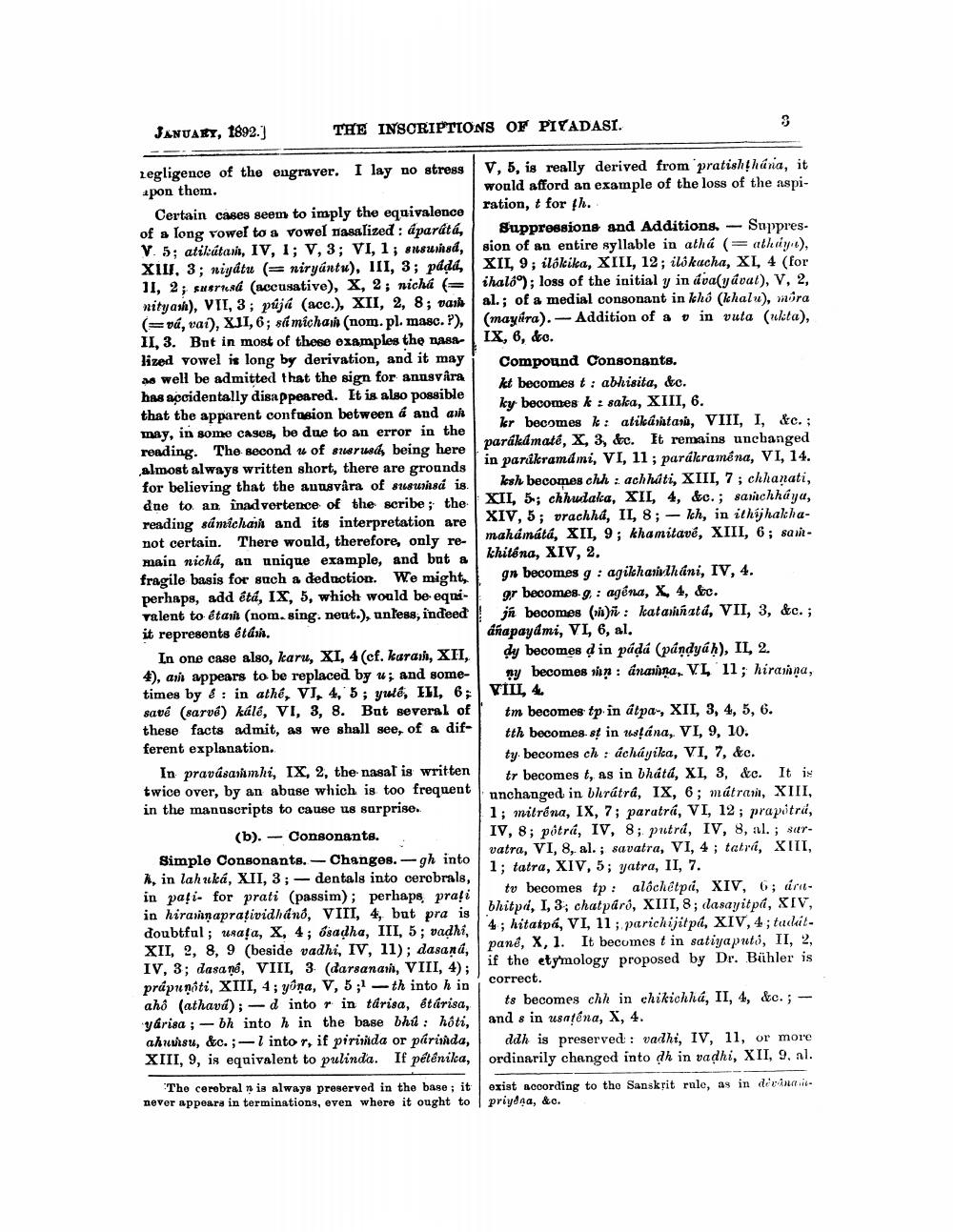Book Title: Indian Antiquary Vol 21 Author(s): Richard Carnac Temple Publisher: Swati Publications View full book textPage 9
________________ JANUARY, 1892.) THE INSCRIPTIONS OF PIYADASI. -- - zegligence of the engraver. I lay no stress V, 5, is really derived from pratishthánia, it upon them. would afford an example of the loss of the aspiCertain cases seem to imply the equivalence ration, t for th. of a long vowel to a vowel nasalized : áparatá, Suppressions and Additions. - Suppres. V. 5; atikútası, IV, I; V, 3; VI, 1; Susurinsa, sion of an entire syllable in atha (= athriye), XIII, 3; niyátu (=niryántu), III, 3; padd, XII, 9; ilóleika, XIII, 12; ilskacha, XL, 4 (for JI, 2 ; susrnsd (accusative), X, 2; nichá (= ihal6%); loss of the initial y in dva(yávat), V, 2, nityash), VII, 3; pújá (acc.), XII, 2, 8; vanhal.; of a medial consonant in khó (khalu), wora (=vá, vai), XJI, 6; sc michani (nom.pl. masc. ?), (maytira). - Addition of a o in vuta (ukta), II, 3. But in most of these examples the nasa- IX, 6, &c. lized vowel is long by derivation, and it may Compound Consonants. as well be admitted that the sign for annsvåra kt becomes t : abhisita, &c. has accidentally disappeared. It is also possible ky becomes k : saka, XIII, 6. that the apparent confusion between a and an may, in some cases, be due to an error in the ker becomes k: atikavitasi, VIII, I, &c.; reading. The second 14 of serwis being here parákámaté, x, 3, &c. It remains unchanged almost always written short, there are grounds in parikramami, VI, 11 ; parákraména, VI, 14. for believing that the aungvâra of susurhsá is. kesh becomes chh : ach hati, XIII, 7; chhanati, dne to an inadvertence of the scribe; the XII, 5; chhulaka, XII, 4, &c.; samchhaya, reading sámichain and its interpretation are XIV, 5; vrachha, II, 8; - kh, in ithihakhanot certain. There would, therefore, only re mahámátá, XII, 9; khamitavé, XIII, 6; santmain nichá, an unique example, and but a khitana, XIV, 2. fragile basis for such a deduction. We might, gn becomes g: agikharivtháni, IV, 4. perhaps, add étá, IX, 5, which would be equi- gr becomes 9, : agéna, X 4, &c. valent to étari (nom. sing. nout.), unless, indeed jn becomes (nl: katarinata, VII, 3, &c.; it represents étain. áñapayámi, VI, 6, al. In one case also, karu, XI, 4 (cf. karak, XII, dy becomes d in pádá (pándyah), IL, 2. 4), an appears to be replaced by W; and some- ny becomes in: anaina, VL 11; hiraziņa, times by &: in athé, VI, 4, 5; yuté, III, 6; VIIL, 4 savé (sarvé) kálé, VI, 3, 8. But several of tm becomes tp in atpa, XII, 3, 4, 5, 6. these facts admit, as we shall see, of a dif tth becomes st in us!ána, VI, 9, 10. ferent explanation. ty becomes ch: dcháyika, VI, 7, &c. In pravásahumhi, IX, 2, the nasal is written tr becomes t, as in bhátá, XL, 3, &c. It is twice over, by an abase which is too frequent unchanged in bhrátrá, IX, 6; mátran, XIII, in the manuscripts to cause us surprise. 1; mitrāna, IX, 7; paratrá, VI, 12; prapritra, (b). - Consonante. IV, 8; potra, IV, 8; putra, IV, 8, al.; sarSimple Consonants. - Changes. -gh into vatra, VI, 8, al.; savatra, VI, 4 ; tatri, XIII, A, in lahuká, XII, 3; - dentals into cerebrals, 1; tatra, XIV, 5; yatra, II, 7. in pați- for prati (passim); perhaps prați to becomes tp : alôchétpa, XIV, 6; artin hirarnaprațividháno, VIII, 4, but pra is bhitpd, 1, 3; chatpâró, XIII, 8; dasayitpa, XIV, doubtful; waļa, X, 4; ósadha, III, 5; vadki, | 4 ; hitatpá, VI, 11 ; parichijitpi, XIV, 4; tudat. XII, 2, 8, 9 (beside vadhi, IV, 11); dasand, pané, X, 1. It becomes t in satiyaputi, II, 2, IV, 3; dasaná, VIII, 3 (darsana, VIII, 4); if the etymology proposed by Dr. Bühler is práprņoti, XIII, 4; yona, V, 5; - th into hin correct. ahố (athavd); -d into rin tarisa, étárisa, ts becomes chh in chikichhú, II, 4, &c.; - yárisa ; - bh into h in the base bhí : hôti, and 8 in usaténa, ., 4. ahusu, &c. ;-l into r, if pirinda or parinda, ddh is preserved : vadht, IV, 11, or more XIII, 9, is equivalent to pulinda. If pétênika, ordinarily changed into dh in vadhi, XII, 9, al. The cerebral n is always preserved in the base; it never appears in terminations, even where it ought to exist according to the Sanskrit rulo, as in die priyaa, &c.Page Navigation
1 ... 7 8 9 10 11 12 13 14 15 16 17 18 19 20 21 22 23 24 25 26 27 28 29 30 31 32 33 34 35 36 37 38 39 40 41 42 43 44 45 46 47 48 49 50 51 52 53 54 55 56 57 58 59 60 61 62 63 64 65 66 67 68 69 70 71 72 73 74 75 76 77 78 79 80 81 82 83 84 85 86 87 88 89 90 91 92 ... 430
